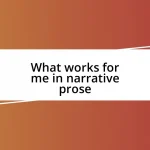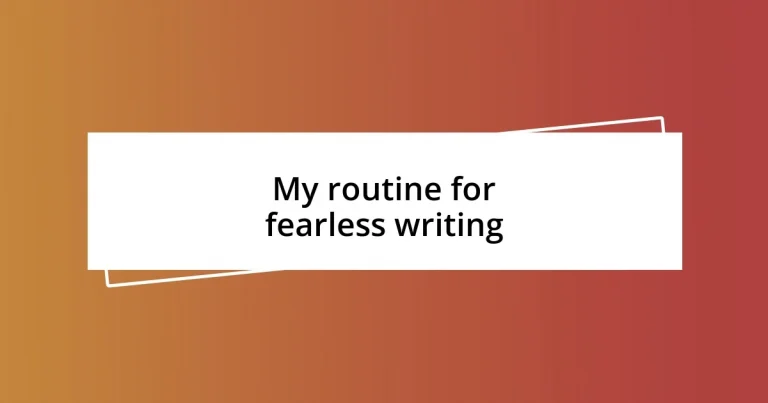Key takeaways:
- Fearless writing embraces vulnerability, allowing writers to connect authentically with their audience through shared experiences.
- Building a writing mindset involves self-compassion, consistency, and visualizing an encouraging audience to transform fear into excitement.
- Seeking feedback and celebrating progress fosters growth, enhances writing skills, and strengthens connections within the writing community.

Understanding fearless writing
Fearless writing is about embracing vulnerability on the page. I remember my first time sharing a deeply personal poem; my heart raced as I hit ‘publish.’ Would people connect? But when the feedback poured in, I realized that my truth resonated with others. This taught me that fearless writing isn’t just about boldness; it’s a bridge to authenticity.
To me, understanding fearless writing means breaking through the walls of self-doubt. Sometimes I ask myself, “What if my words can inspire someone?” That question nudges me to confront my fears and push past perfectionism. I often remind myself that the messy, unrefined parts of writing hold the most power. When I take this leap, it feels liberating—like shedding an old skin.
Fearless writing also involves recognizing that everyone has their own inner critic. On days when negative thoughts creep in, I visualize sharing my experiences with a friend. It’s easier to be compassionate to someone else, isn’t it? That perspective not only emboldens my voice but also transforms my work into something relatable and meaningful.

Building a writing mindset
Building a writing mindset starts with cultivating self-compassion. I remember a time when I submitted a piece I was insecure about, fearing harsh criticism. To my surprise, the feedback was constructive and supportive. That experience taught me that embracing my imperfections can lead to unexpected support and connection.
Moreover, consistency is key. I set aside time daily to write, even when I feel blocked. In those quiet moments, I remind myself that not every word needs to be perfect; it only needs to be genuine. This simple habit has transformed writing from a chore into a cherished ritual, which fuels my confidence.
Lastly, I find it beneficial to visualize my audience. When I write, I imagine a friend sitting beside me, encouraging me. This mental image helps me speak from the heart instead of overthinking my words. I’ve discovered that this approach turns fear into excitement—a pivotal shift that solidifies my writing mindset.
| Aspect | Details |
|---|---|
| Self-Compassion | Embracing imperfections leads to supportive feedback. |
| Consistency | Daily writing transforms it into a treasured habit. |
| Visualizing Audience | Mental imagery helps turn fear into excitement. |

Developing daily writing habits
Developing daily writing habits can feel like a daunting task, but I’ve learned to approach it one small step at a time. When I first started, all I committed to was five minutes in the morning. Surprisingly, those brief sessions blossomed into full-blown writing marathons as my comfort grew. Over time, I found that this practice not only sharpened my skills but also nurtured my creative flow.
- Even on busy days, I carve out short, focused intervals for writing, reminding myself that progress doesn’t require hours.
- I set a timer for 15 minutes and write without judgment, allowing my thoughts to spill onto the page freely.
- In connecting with my emotions during these sessions, I discover insights that might otherwise remain hidden.
- Most importantly, I celebrate all victories, however small, creating a positive feedback loop that propels me forward.
As I navigated this journey, I noticed that establishing a specific location for writing made a world of difference. I created a cozy nook in my home, complete with my favorite mug and a comforting blanket. This space became a haven for my thoughts, and the routine of sitting there daily solidified my dedication. Each time I settled in, I felt a spark of excitement, knowing I was stepping into a world where my words would come to life.

Overcoming fear of judgment
Overcoming the fear of judgment often requires a shift in perspective. I’ve often felt that nagging voice in my head saying, “What will they think?” One day, I decided to write about an experience that was deeply personal. I hesitated, but I pressed “publish.” To my amazement, the response was overwhelmingly positive. That taught me that vulnerability can create a strong connection with my audience, allowing others to relate to my journey.
Sometimes, I even challenge myself with a simple exercise: I select a topic I care about and write a piece as if no one will ever read it. It’s liberating! This practice helps me strip away the layers of self-doubt and focus purely on expressing my thoughts. I can recall feeling more alive in those moments, where the act of writing became a dialogue with my inner self instead of a performance for others.
Another approach that has worked wonders for me is surrounding myself with a supportive writing community. I remember attending a local writing group for the first time, and I was nervous about sharing my work. However, when I finally read my piece aloud, I was met with kindness and encouragement. It made me realize that we’re all in different stages of our journeys, and the fear of judgment is often shared. This connection helped me see that, rather than facing criticism, I could find camaraderie.

Embracing vulnerability in writing
Embracing vulnerability in writing is a journey I never expected to cherish. I remember sitting at my desk, heart racing, as I poured my soul into a piece about a failure that weighed heavily on me. I hesitated before hitting publish. With that click, I exposed my truth. To my surprise, the feedback flooded in—people shared their own stories of struggle, and I felt an overwhelming sense of belonging. Can vulnerability really bridge the gap between writer and reader? In my experience, it absolutely does.
As I’ve bared my soul on the page, I’ve discovered something profound: the stories that make us feel most uncomfortable often resonate the deepest. I once wrote a piece about a panic attack I experienced in a crowded room, an experience I’d buried in shame. The moment I let those words flow, I felt lighter. Just by articulating that pain, I connected with others who’d faced similar battles. Isn’t it fascinating how sharing our rawest moments can spark healing, not just for ourselves, but for our readers too?
I’ve found that integrating vulnerability into my writing cultivates authenticity. When I share my fears and insecurities honestly, I foster a safe space for my audience. This isn’t always easy; I still grapple with the urge to hide behind polished prose. Yet, the more I practice embracing vulnerability, the more I understand its power. Writing about real emotions isn’t merely an exercise—it’s a lifeline, reminding me that we are all beautifully flawed human beings navigating this chaotic world together.

Seeking feedback and growth
Seeking feedback has become an essential part of my writing journey. I remember submitting a short story to a literary magazine after months of rewriting. The editor’s feedback was both constructive and brutal. At first, it stung. I felt defensive about my work. However, taking a step back, I realized that this feedback was an opportunity for growth. Learning to embrace criticism has helped me enhance my writing skills and develop a sharper eye for detail. Isn’t it fascinating how what feels like a setback can actually propel us forward?
I’ve also encountered the transformative power of peer reviews. In one instance, I exchanged pieces with a fellow writer in my group. I was nervous about what she might say about my story, but her insights opened my eyes to new perspectives. She pointed out areas where my characters could be more vivid, which prompted me to bring them to life in ways I hadn’t even considered. That experience taught me that collaboration can illuminate blind spots and encourage us to dig deeper into our narratives. Have you ever had a moment when someone’s feedback made you see your writing in a whole new light?
Lastly, I’ve noticed that seeking feedback from different sources—friends, professionals, and even online forums—can nurture growth in unexpected ways. One time, I shared a personal essay on a writing platform, expecting mixed reviews. To my surprise, a stranger reached out, sharing how my words inspired them in their own struggles. This interaction reminded me that feedback isn’t solely about improving craft; it’s about making connections and impacting lives. It really makes me wonder: how often do we underestimate the ripple effect our words can have on others?

Celebrating progress and achievements
Celebrating progress in writing gives me a surge of motivation that’s hard to describe. After I finished my first draft of a novel I’d dreamt of writing for years, I took a moment to reflect on the commitment it took to get there. I remember treating myself to a cozy coffee shop visit, savoring a rich mocha. I felt every bit of that celebration—the hard work and sleepless nights were finally coming to fruition. Doesn’t it feel wonderful to acknowledge those milestones, no matter how small?
Every achievement, like completing a writing challenge or receiving my first positive comment from a reader, deserves a moment of recognition. I still recall my heart skipping a beat when a beta reader told me my story made them laugh and cry—what a reward! In those moments, I fully appreciated the impact my words had on someone else’s life. Have you ever paused to celebrate a win, big or small? Each accomplishment fuels my passion and reminds me that the journey is worth every second.
I’ve also discovered the joy of sharing my achievements with fellow writers. I once organized a small gathering for friends in the writing community to discuss our recent milestones. As we shared our successes, it became a powerful reminder that we are all in this together. The encouragement we exchanged ignited new ambitions. If I’ve learned anything, it’s that celebrating victories is not just about looking back; it’s about propelling ourselves forward. How do you mark your own achievements, and how does it impact your writing journey?













